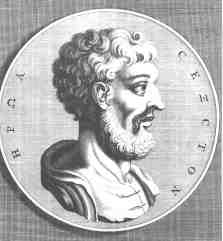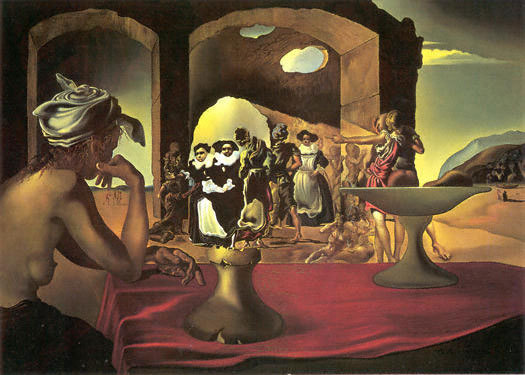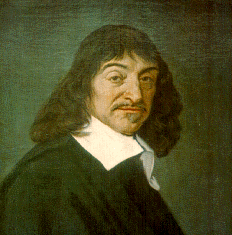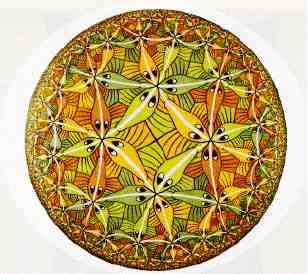 Scepticism
Scepticism|
|
Introduction to Philosophy |
 Scepticism
Scepticism
Contents |
|
'Some years ago I was struck by the large number of falsehoods that I had accepted as true in my childhood, and by the highly doubtful nature of the whole edifice that I had subsequently based on them. I realized that it was necessary, once in the course of my life, to demolish everything completely and start again right from the foundations ... ' Descartes, Meditation I para 1 [The link is to a different translation. Close the window when you are done.] |
There is surely a good idea here. It's what we go to University for. We have been given/picked up an enormous amount of information or stuff presented as information during our early years, from parents, deliberately or accidentally, from school, from friends etc. etc. As we get older, as we develop our own critical powers we need to begin to review what we have acquired, sort the wheat from the chaff, get rid of those things we have acquired which don't really stand up, and hang on to those that are reasonably solid.
Descartes is proposing something more radical than this of course. He is suggesting that we can think of what we have acquired as a building, but a building which in his case anyway he already has reason to think is rickety - dangerous in fact. It is not something we can put right through a spot of DIY at the weekends, as I suppose I was suggesting just now. We have to move out, demolish and build again.
 That sets Descartes
searching for foundation stones. He sets about looking through all the beliefs
he has acquired, searching for ones that are absolutely perfect. Once he has
found one or more really solid stones, he can use these as his foundation as
he begins to build his new cognitive house. So long as he then builds carefully,
he will be able to build something safe and lasting, in place of the rickety
ruin that he realizes he is living in when the need for the project first strikes
him.
That sets Descartes
searching for foundation stones. He sets about looking through all the beliefs
he has acquired, searching for ones that are absolutely perfect. Once he has
found one or more really solid stones, he can use these as his foundation as
he begins to build his new cognitive house. So long as he then builds carefully,
he will be able to build something safe and lasting, in place of the rickety
ruin that he realizes he is living in when the need for the project first strikes
him.
This may be different from the way we see things ourselves. We may think we need to review what we think, and keep what we believe under continuing review, but we may not think it's a matter for demolition and rebuild. Descartes was living in different times of course and this perhaps partly accounts for his more revolutionary outlook. The beliefs his background had given him were you might say medieval - literally medieval - and it was Descartes, along with a handful of others, who were driven by the conviction that wholesale change was necessary. For him, it was a question of demolish then rebuild.
For us as individuals it might well be something less dramatic that makes sense - unless you think the time has come for another wholesale change of the kind Descartes and a few others brought about when they ushered in the Modern world: our world.
Descartes starts off with the thought that beliefs derived directly from the senses would seem to be the ones we can be most sure of.
Eg in my case that I am standing here, in front of you, talking.
Descartes: 'that I am here, sitting by the fire, wearing a winter dressing-gown, holding this piece of paper in my hands, and so on.' Meditation I para 4, Veitch translation.
We still say 'I saw it with my own eyes', 'See for yourself'.
We think of our senses being in certain circumstances the source of absolutely reliable information. You hear people say that they would only believe in ghosts if they actually saw one for themselves.
But we saw in a previous presentation that the scientific understanding of perception casts doubt on the reliance we can place on the senses.
Descartes gives further reasons. For one thing, he says, insane persons are mistaken about what their senses tell them.
They firmly maintain eg
|
' that they are kings when they are paupers, or say that they are dressed in purple when they are naked, or that their heads are made of earthenware, or that they are pumpkins, or made of glass.' First Meditation, Veitch translation |
 |
|
Dali, The Slavemarket , Courtesy the Dali Museum |
Moreover, Descartes continues, we are all taken in by dreams.
In our dreams we have all kinds of beliefs which we accept afterwards are mistaken.
(This is a Western view of dreaming of course. There are cultures who view dreaming as looking through a window into a different reality. The Don Juan books by Castenada tell of such things. Such explorations bring out that when we dream we are in such and such a place doing such and such a thing, we are not forced to see this as a case of false belief, just because our friends see us lying in our bed all the time these experiences took place. We can think of our spirit leaving our body and engaging in various adventures while our body stays put.)
| Dreams needed for research |
Descartes' main point in discussing dreaming is that it shows beliefs apparently based directly on the senses can be mistaken. But in the course of making it he discusses the conceptual constraints even dreaming is governed by.
He says that though we draw in our dreaming on real sense experience, which we simply reconfigure in various ways, dream experiences are made up of elementary components the reality of which even dreaming doesn't cast doubt upon.
In a similar way, painters composing fictitious scenes use elements that are real enough:
|
' For even when painters try to create sirens or satyrs with the most extraordinary bodies, they simply jumble up the limbs of different animals. Or if perhaps they manage to think up something so new that nothing remotely similar has ever been seen before - something which is therefore completely factitious and unreal - at least the colours used in this composition must be real. By similar reasoning, although these general kinds of things - eyes, head, hands and so on - could be imaginary, it must at least be admitted that certain other even simpler and more universal things are real. These are as it were the real colours from which we form all the images of things, whether true or false, that occur in our thought. This class appears to include corporeal nature in general, and its extension; the shape of extended things; the quantity, or size and number of these things; the place in which they exist, the time through which they may endure, and so on.' Descartes, Meditations I, para 6 |
 Descartes appears
to be saying that although dreaming undermines the certainty with which we can
hold certain beliefs, there are others that it does nothing to undermine.
Descartes appears
to be saying that although dreaming undermines the certainty with which we can
hold certain beliefs, there are others that it does nothing to undermine.
This is because he thinks there is a limit to the weirdness of dreaming.
One suggestion is that 'corporeal nature in general' belongs to one of the universal assumptions of dreaming.
I think what he means here is that though we can dream of a world peopled with weird and wonderful things, the things we dream of are things for all that - they are material objects and/or people. We don't dream of worlds in which the notion of an individual material object doesn't apply.
Prompt: Or do we?
Find the wildest dream in your group and write it down - wildest meaning making the biggest contrast with ordinary experience. Has anyone dreamt of a world in which there were no physical objects?
Descartes thinks that the laws of geometry and arithmetic hold in our dreams as well:
"… [F]or whether I am awake or dreaming, it remains true that two and three make five, and that a square has but four sides; nor does it seem possible that truths so apparent can ever fall under a suspicion of falsity [or incertitude].
Meditations 1 paragraph 8. Veitch translation.
I wonder if you agree? Has anybody had a dream experience in which the laws of arithmetic were flouted?
It's difficult to be absolutely clear what I'm asking here. We don't often actually do arithmetic in our dreams, and it's not doing arithmetic in the paper and pen sense I'm wanting to ask about. In our ordinary non-dream activities we are constantly expecting things to follow the laws of arithmetic. If I stock up with cat food and buy five tins, and then put them on the shelf with the one that is left from last week, I have the expectation that there will now be six tins on the shelf. I don't need to get pen and paper out to assure myself of this. I just have an expectation of this kind, an expectation that guides my behaviour but doesn't occupy my explicit calculational powers. It's the same with many many of my ordinary activities - my expectations about their results and indeed my planning of them rest on elementary laws of arithmetic, laws which if not followed would ordinarily create some bewilderment. If I bought 5 tins and found that when I put them on the shelf with the one from last week there were seven tins in total, or 32, or 24000, that would leave food for thought - plenty over from the cat.
So a follow up question: has anybody had a dream where this kind of thing happens?
And what of the laws of geometry? Descartes thinks these are in the same case as the laws of arithmetic - as he maintains, laws for our dreams as well as for our waking life.
Has any one dreamt of five-sided squares or straight lines which loop back on themselves? It's difficult to be sure what these questions amount to. A five-sided square sounds like it isn't a square at all but a pentagon or something. But then it sounds as though Descartes must be right - no one dreams of a five-sided square.
There are other ways in which the laws of geometry could conceivably be flouted though. Suppose you started on a space trip heading in a particular direction and after a few years found yourself approaching the earth - but without ever deviating from the direction you had started out in. Provided you had a way of establishing that you had indeed been travelling in exactly the same direction all the time it would be a very puzzling thing to find yourself after a year or two's travelling back where you started. Would one option then be to conclude that the laws of geometry we thought held don't in fact hold? If they held, if you kept to a straight line you would get further and further away from your starting point. So that if you keep going in a straight line and yet get back to your starting point, you might conclude that those laws were not holding.
 |
| The artist M. C. Escher was fascinated with alternative geometries, composing
'a series of "Circle Limit" illustrations of a hyperbolic universe'.
Here he uses the backbones of the flying fish as "straight lines",
being segments of circles orthogonal to his fundamental circle. Thanks to
Joseph
F. McDonnell, S.J. |
I think a different option might be to conclude that space is curved - whatever that might mean.
So our experience of dreaming makes us doubt some things, but leaves the certainty of others intact, including mathematical truths. Having presented this thought, he proceeds to demolish it. There are reasons for thinking that even mathematical propositions are subject to doubt:
'One reason is that people have made mistakes in reasoning in such matters, and have held as certain and self-evident what we see to be false.' (The Principles of Philosophy, Part I, Section 5)
That's one reason then. People make mistakes in mathematics, but when they do they can be quite adamant that they are right.
So Descartes thinks we can be mistaken, even about simple moves in arithmetic and geometry.
Do you agree?
Could we be mistaken about two and three making five? We could use different words for these numbers of course - as they do in Japan, or Bangor. But if we are talking about the numbers and not about words could we be wrong about two and three making five?
Could we be wrong about the point that if you head of in one direction and keep going in that direction you will always be getting further away from your starting point (and never arrive back at it) ?
Descartes thinks Yes - it is conceivable that you could be mistaken about these things.
- He doesn't think you necessarily are mistaken, he just thinks you can conceive of the possibility of being wrong about them.
He puts his point in dramatic terms. God is all powerful , isn't he - can do anything. He could surely mislead us. He could surely implant in us a wrong way of doing arithmetic, a wrong set of beliefs about geometry.
'A more important reason [than the fact that we sometimes make mistakes in geometry and arithmetic] is that we have been told that God who created us can do all that he desires, and we do not yet know whether he may not have willed to create us in such a way that we shall always be deceived even in the things that we think ourselves to know best. (The Principles of Philosophy, Part I, Section 5.)
You may not believe in God. But does that alter the point? You can conceive of the possibility of there being God, surely - you deny that there is a God, but you know what you are denying, you can conceive of the possibility of there being one. But if you can conceive of the possibility of there being a God Descartes has his point, because then you have to conceive of the possibility of God deceiving us over arithmetic and geometry, and you have to conceive of the possibility of our arithmetic and geometry being wrong.
Descartes' most powerful sceptical argument so far is that we cannot rule out the possibility that God, the Supreme Being and Creator of all, might systematically mislead us about the world we appear to live in (- capping his arguments based on the unreliability of our senses, the misplaced confidence of people suffering insane delusions and everybody's experience of dreaming.)
But he then considers an objection: if God did that, He wouldn't be God! God is by definition good as well as all powerful, and no completely good Being could enter into such a wholesale deceit.
Descartes doesn't argue this out, although it has to be argued out if you are thinking about the problem of evil - of how there can be a God if there is ignorance and evil in the world he created. But in the context of this argument Descartes quickly concedes the point.
OK, let's not try and think of God deceiving us. Think then not of God but some sort of devil, some kind of powerful superior being who could mess with us, give us the wrong geometry, the wrong arithmetic. Surely this is conceivable? Once again, Descartes does not say he thinks there is such a being, just that you can conceive of the possibility that there could be one. The bare possibility is enough. If it is possible that there might have been or might be such a being, then there is the possibility that our arithmetic and geometry might be wrong.
This is Descartes' invocation of a possible Evil Demon:
'I will suppose ... that ... some malicious demon of the utmost power and cunning has employed all his [sic] energies in order to deceive me. "
 Such
a Demon could conceivably deceive us not only about what our senses seem to
tell us, but also about arithmetic and geometry.
Such
a Demon could conceivably deceive us not only about what our senses seem to
tell us, but also about arithmetic and geometry.
A modern variation might be: mightn't evolution have programmed into us some basic 'certainties', because they have not truth but survival value. Maybe 2+3 isn't always 5, but since it is overwhelmingly so in this part of the universe, natural selection would have bred certainty about it into us. -?
(Does this make absolutely everything uncertain? Does it mean that in our project of reviewing our belief-structure we have found nothing we can be certain of? That was Descartes' strategy, if you remember: to demolish, then to pick over the heap of stones to see if there wasn't something that could serve as a foundation for a new building - a stone - or stones - that would be substantial and solid enough for a really safe new building to be erected. It seems as if that project has run into the ground. There has been a spectacular demolition, but so spectacular as to leave nothing unscathed.)
(So it is intelligible that) at the end of the First Meditation Descartes sums up where he has got to, and suggests the predicament is an awful one. Having started with the reasonable project of rejecting everything of which he couldn't be absolutely certain, he has ended up with nothing! All his beliefs have had to be rejected. What we know of the weird beliefs people sometimes hold with absolute conviction (insane people, eg) and the experience of dreaming which most of us seem to share, of believing in the midst of the dream all manner of things that when we come out of the dream we judge to be false, these two thoughts undermine any firm reliance we might have placed in the senses. And then the thought of the Evil Demon gets rid of everything else. So that if the plan is still to retain just those opinions he could be really sure of, he should retain absolutely nothing.
But there is one notable omission from the list of things that the Evil Demon could be conceived of as conning us over. The very thing that we are using as we pursue with such rigour the project of reviewing our beliefs. And this is our power of reason.
It is our reason that says we cannot hold two things that contradict each other. Take two of the statements we have been considering - the statement that we can be certain 2+3=5 and the statement that we can't.
It is our reason that tells us both of these can't be true. If one of them is true the other isn't.
We can be certain 2+3=5
We cannot be certain 2+3=5
What we have here is a simple law of reason which we are all the while appealing to, explicitly or implicitly. You have lost an argument if you have been driven to contradict yourself. Knowing this, if you are arguing with someone - or yourself - you always try to avoid such a fate.
Might this law be mistaken? If we properly understood the laws of reason, could it be that it would be perfectly OK to contradict yourself?
Prompt: What do you think?
Compare: If we properly understood the laws of arithmetic, could it be that 2+3=73?
Suppose we accepted that the Evil Demon could mislead us about reasoning as well as about arithmetic. Wouldn't that cast doubt on the whole argument Descartes is taking us through? He thinks his argument shows that we can't be certain of what our senses tell us, or of arithmetic, or geometry. But if it shows that we can't be certain of reason either, isn't that self-destructing? If the reason that proves we can't be certain of our senses is itself vulnerable to doubt doesn't that mean the senses can be relied on after all?
If the reason that proves we can't be certain of arithmetic is itself vulnerable to doubt doesn't that mean we can rely on arithmetic after all?
Unfortunately, I don't think so. If it did, by parity of reasoning we would have the embarrassing deduction:
If the reason that proves we can't be certain of reason is itself vulnerable to doubt doesn't that mean we can rely on reason after all?
In fact when you read on in the Meditations it turns out that Descartes thinks that the Evil Demon cannot be thought of as having tampered with our reason. He can be thought of as misleading us over arithmetic, and over geometry, but not when it comes to our reason.
He thinks that there are some claims which our reason is capable of telling absolutely MUST be true, past all possibility of doubt.
Prompt: As a refresher, remind yourself of one of the things Descartes thinks our reason assures us is true beyond all possibility of doubt?
It is this that turns Descartes away from the sceptical path he is pursuing so vigorously in that First Meditation. Once you have taken the view that your reason gives you access to certainty, you can put it to work, and you can persuade yourself that all sorts of things are after all beyond doubt. For Descartes, my reason tells me with certainty that I exist, that God exists, and that the world He or She created must be much as we see it as we look around ourselves. Descartes becomes anything but a sceptic, in spite of the first thoughts he presents to us, which are so radically sceptical in character.
But what if one tries to be sceptical about reason, as Descartes had shown us how to be sceptical about what our senses appear to tell us, and about arithmetic, and about geometry? Then one becomes a sceptic proper. One thinks there is nothing we can be certain about - nothing whatever.
You may say: well, that doesn't matter very much. Maybe I can't be certain of anything, but that doesn't stop me believing a whole lot of things are probably true. It means that Descartes' project of demolition, followed by rebuilding on foundations of certainty, is going to fail, but it doesn't mean that we have to somehow run our lives on the basis of complete and utter ignorance. We can have opinions, beliefs, based on probabilities.
The proper sceptic however will insist at this point that we go back to the beginning of Descartes' arguments and ask not
Can we be certain about this?
but
Do we have any reason at all to believe it?
Do we have any reason at all to think our senses reveal to us the world as it is? Do we have any reason at all to think mathematics is valid? Do we have any reason at all to think that our reason is the least bit reliable?
If we answer No to these questions we have acquired the perspective of the sceptic, who denies that we can have rational belief at all.
This is not to say we don't have any beliefs, only that none of the beliefs that we have have any rational basis. David Hume, the great sceptic of the Modern era, suggested that the beliefs that we find it hardest to seriously question, like our belief in causality, were psychological compulsions.
Why shouldn't he be right?
Dark Star: there are limits to scepticism.
Credits
Header portrait - Sextus Empiricus - thanks to Université de Genève
Evil Demon pic thanks to sis at Bristol
Uni, now removed
Last Revised 30:01:05